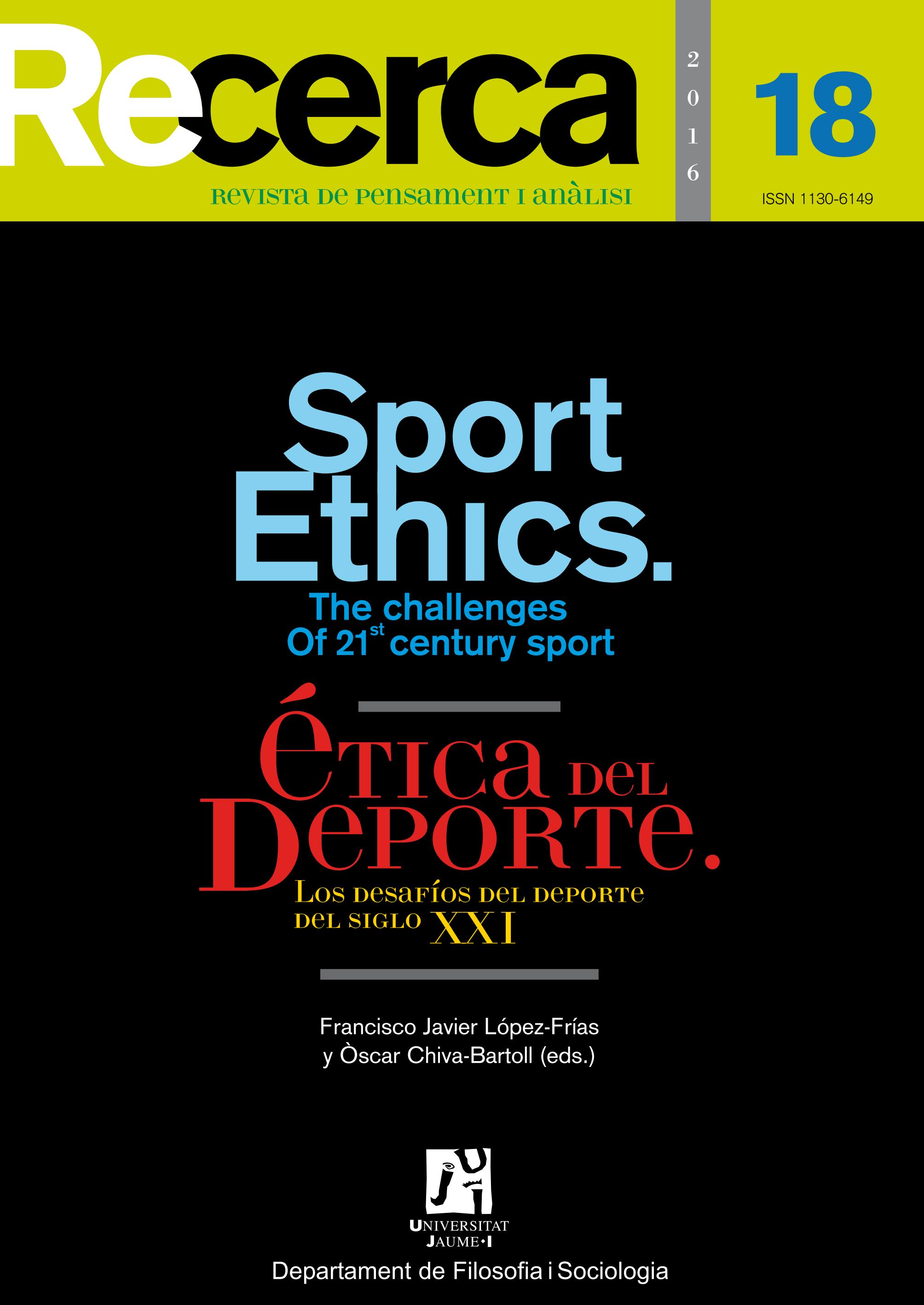Ethical potentialities on physical education as a vehicle for ethical education through sports
Contenido principal del artículo
Resumen
Sports occupy an interesting ethical space from a pedagogic point of view, being included in physical education curricula in most Western countries. The approach of physical education to sports as vehicle for ethical education is too limited when it is restricted to their minimal functional, constitutive and regulatory goals. This essay’s aim is to argue the extent to which the ethical potential of physical education can embrace more than functional purposes, or whether that will be neglected in terms of limited educational aspirations. We present data from nineteen exploratory interviews with experienced philosophy, sports and physical education researchers and teachers, from six different nations, concerning the ethical potentiality of physical education. We highlight five ethical themes: (i) the regulatory and normative structure of sports; (ii) the spirit of sports and its internal values; (iii) the right playing/doing of sports; (iv) the overcoming in sports; and (v) sports as an opportunity for a supererogatory ethics as fertile ground for future operationalization of the potential of physical education for ethical education through sports.
El deporte ocupa un interesante espacio ético desde un punto de vista pedagógico, integrándose en los curricula de educación física en la mayoría de países occidentales. El planteamiento de la educación física como vehículo de la educación ética es limitado cuando restringido a sus objetivos mínimos funcionales, constitutivos y regulatorios. El objetivo de este estudio es discutir si el potencial ético de la educación física puede ir más allá de los propósitos funcionales, que considerados aisladamente constituyen un desperdicio de la experiencia pedagógica del deporte. Para conseguirlo, presentamos datos de diecinueve entrevistas exploratorias con experimentados investigadores y profesores de filosofía, deporte y educación física relacionadas con las potencialidades éticas de la educación física. La muestra incluye individuos de seis diferentes nacionalidades, cuyo trabajo demuestra preocupaciones con el tema. La argumentación resulta de cinco temáticas principales: (i) Estructura normativa y regulativa del deporte; (ii) El espírito del deporte y sus valores internos; (iii) El bien hacer deportivo; (iv) La superación deportiva; (v) El deporte como oportunidad de una ética supererogatoria como contexto fértil para la concretización del potencial ético de una educación deportiva.
Descargas
Detalles del artículo
Citas
Aristotle. (2009): Ética a Nicómaco. Translation by António de Castro Caeiro. Lisbon: Quetzal Editores.
Ávila Da Costa, L.; Mcnamee, M. and Lacerda, T. (2015a): Physical education as an aesthetic-ethical educational project. European Physical Education Review 21(2), pp. 162-175.
Ávila Da Costa, L.; Mcnamee, M. and Lacerda, T. (2015b): «Sport as a vehicle of aesthetic education». Paper not published, and accepted to publication in Sport, Ethics and Philosophy, 3rd issue of 2016, titled «Hermeneutics and Sport».
Bento, J. O. (2010): Da coragem, do orgulho, da paixão de ser professor. Auto-retrato. (From the courage, the pride and the passion of being teacher) 2nd edition. Belo Horizonte: Casa da Educação Física.
Feezell, R. (2013): Sport, Philosophy and Good Lives. Lincoln: University of Nebraska Press.
Feinberg, J., (1968): «Supererogation and Rules». In ETHICS, J. Thomson and G. Dworkin (eds.), New York: Harper and Row.
Feldman, F. (1986): Doing the Best We Can. Dordrecht: Reidel.
Hämäläinen, M. (2014): «Three standards of athletic superiority». Journal of the Philosophy of Sport, vol. 41, n. 3, pp. 289-302.
Kretchmar, R. S. (1975): From test to contest: an analysis of two kinds of counterpoint in sport. Journal of the Philosophy of Sport, n. 2, vol. 1, pp. 23-30.
Lacerda, T. O. and Mumford, S. (2010): The Genius in Art and in Sport: A Contribution to the Investigation of Aesthetics of Sport. Journal of the Philosophy of Sport, vol.37, n.2, pp. 182-193.
Lipovetsky, G. (2010): O crepúsculo do dever. (Duty twilight) Alfragide: Dom Quixote.
Macintyre, A. (2007): After virtue: a study in moral theory. 3rd edition. Indiana: University of Notre Dame Press.
Mcnamee, M. (1992): Physical Education and the development of personhood. Physical Education Review, vol. 15, n.1, pp. 13-28.
Mcnamee, M. (2007): «Sport, ethics and philosophy; context, history, prospects». Sport, Ethics and Philosophy, vol.1, n.1, pp. 1-6.
Mcnamee, M. (2008): Sport, virtues and vices. Morality plays. London: Routledge.
Mcnamee, M. (2010): The ethics of sport. A reader. London: Routledge.
Mcnamee, M.; Morgan, W. J. (2015). Routledge Handbook of the Philosophy of Sport. New York: Routledge.
Mcnamee, M; Parry, J. (1998). Ethics and Sport. London: Routledge.
Meakin, D.C. (1986): The moral status of competition: an issue of concern for physical educators. Journal of the Philosophy of Sport, vol. 20, n.1, pp. 59-67.
Meakin, D.C. (1990): How physical education can contribute to personal and social education. Physical Education Review, vol.13, n.2, pp. 108-119.
Morgan, W. J. (2007). Ethics in sport. 2nd ed. Champaign Ilinois: Human Kinetics.
Pestalozzi, J. H. (2009): Cartas sobre educación infantil. (Letters about child education). Madrid: Tecnos.
Reddiford, G. (1993): Constitutions, institutions and games. Paris: Gallimard.
Reid, H. (2010): «Athletic heroes». Sport, ethics and philosophy, vol. 4, n. 2, pp. 125-135.
Ricoeur, P. (1990): Soi-même comme un autre. (Oneself as another). Paris: Éditions du Seuil.
Sérgio, M. (2014): Ética e Valores no Desporto. (Ethics and Values in Sport). Porto: Edições Afrontamento.
Simon, R. (2000): «Internalism and internal values in sport». Journal of the Philosophy of Sport, vol. 27, n. 1, pp. 1-16.
Simon, R.; Torres, C.; Hager, P. (2015): Fair Play: The ethics of sport. 4th edition. Boulder CO: Westview Press.
Sousa Santos, B. (2000): A crítica da razão indolente – contra o desperdício da experiência. (The critique of lazy reason – against the waste of experience). Porto: Edições Afrontamento.
Suits, B. (2005): The Grasshopper. Games, Life and Utopia. London: Broadview encore editions.
Torres, C. (2011): Gol de media cancha. Conversasiones para disfrutar el deporte plenamente. (Goal from the middle field. Conversations to fully enjoy sport). Buenos Aires: Miño y D’ávila editors.
Torres, C. (2014): The Bloomsbury Companion to the Philosophy of Sport. London: Bloomsbuty.


